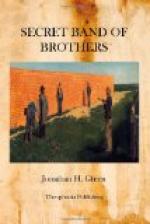in his travels through the south. He told me
gambling. I asked him how long he had been engaged
in that nefarious business. He said twelve or
thirteen years. I asked him if he knew many gamblers?
He said he did. I asked him if he ever knew one
by the name of Green? He said he did. I asked
his name? He answered, “John;” said
he knew him in 1832, 1833, 1834, and 1835, and saw
him in 1842 in St. Louis. I asked him if he was
intimate with Green? He said he knew him as one
gambler knew another. I asked if I favoured him?
He said if I would stand in the light he would tell
me. I did so. He said I looked like the
man. I told him I was the man, but that I never
knew him by the name of Wyatt. He said I did not;
that Wyatt was not his real name. He then told
me another, which was not his real name, and asked
me if I did not hear of a man being murdered near St.
Louis in the year 1841, and of two men being arrested,
both tried and convicted, one having a new trial granted
him, the other being hung. I told him that I
thought I had. He said he was the man that had
the new trial granted, and was acquitted; “and,”
said he, “they hung the wrong man; he was innocent;
I am the guilty man; but they hung him and cleared
me.” “But,” says I, “you
were under a different name still, at that time.”
He said, “Yes, by none of those names do you
know me, but my real name you are familiar with.
Your name,” said he, “I knew in the year
1832; the gamblers called you John, but Jonathan is
your real name.” My curiosity was highly
excited at the strange management of the murderer.
But you may imagine the increase of it when he told
me his real name. I looked at the murderer, and
could scarcely believe my own eyes; yet he stood before
me a living marvel. I have pledged secresy as
to his real name until after his execution. I
interrogated him on his first steps in vice, and how
he became so hardened. He told me to remember
the treatment he had received from the Lynchers’
lash at Vicksburg. I did, but my eyes could scarcely
credit reality. I had known him in 1832, 1833,
1834, and in the early part of 1835, as a bar-keeper
in Vicksburg. He was never a shrewd card-player,
but at that time was considered an inoffensive youth.
The coffee-house he kept was owned by North, who,
with four others, were executed on the 5th of July,
1835, by Lynch law. Wyatt and three others were
taken on the morning of the 7th, stripped, and one
thousand lashes given to the four, tarred and feathered,
and put into a canoe and set adrift on the Mississippi
river. It makes my blood curdle and my flesh
quiver to think of the suffering condition of these
unfortunate men, set adrift on the morning of the 7th
of July, with the broiling sun upon their mangled
bodies. Two died in about two hours after they
were set afloat. Wyatt and another remained with
their hands and feet bound forty hours, suffering
more than tongue can tell or pen describe, when they
were picked up by some slave negroes, who started




